Sentence patterns
- 格式:ppt
- 大小:53.00 KB
- 文档页数:7
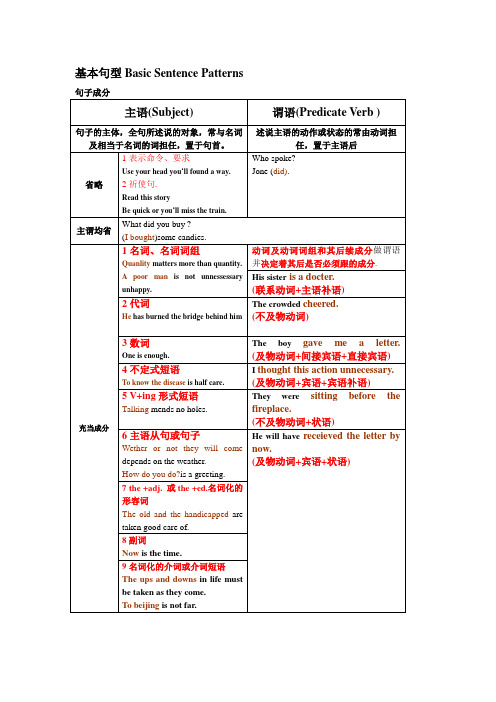

Sentence Patterns1. This point of view doesn’t hold water.2. There is no doubt… Undoubtedly,….. It can be easily denied….Admittedly,…. It can not neglected that….Somebody holds /argues /insists that….3. It is questioned why … It is called into question that….Difference will be found that…4. With regard to, As regards, In general, In my opinion, Therefore,5. Take the view, claim, fail to consider is that…It is proved that…6. Wonderful as A is, however, it has its own disadvantages too.7. The merits outweigh the demerits.8. It has increased by three times as compared with that of ….9. The change /widespread phenomenon in… largely results from the fact that….10. It widely spreads that… (significant growth)The disputes /co ntentious issue that… captures the attention of various circles of society.11. Currently, there is a widespread concern over….12. Knowledge is the necessary prerequisite to wisdom.13. Money is a bottomless sea, in which honor, conscience, and truth may be drowned.14. What has caught our attention is …It is noticeable that the environment in both the rural and urban area is deteriorating.15. It is universally acknowledged that …16. Only if the government will take some appropriate measures, will this intractable problem betackled.17. be doomed to failure, be fraught with (hope), an immense effort of will18. The results of this survey / questionnaire have aroused /drawn nationwide /public attention/concern, which is why some great efforts are being made by our government /society.19. The better course of action is to be more careful when…., considering its particular featureand style.20. I will give an affirmative answer without hesitation, … benefit us in…21. walk out of the ivory tower, take priority over22. sharpen their listening and speaking skills, develop a solid base on which to build their futurecareer, obtain necessary qualifications for future development23. Americans hopes that pressure from the US will force Japan to suddenly dismantle its tradebarriers are almost certain to evaporate in disappointment.24. The whole concept that…25. The arms of friendship /love/ book are enough to stretch from one end of the world to theother.26. Some people viewed the findings with caution, nothing that a cause-and-effect relationshipbetween passive smoking and cancer remain to be shown.27. An significant, growing, overwhelming increasing number of ….28. mushroom all over the world29. Much importance has been placed on the…30. It is taken for granted that…31. It is no exaggeration to say/ portray the idea that…32. As is often pointed out…33. Obviously, the reasons for this phenomenon are not far to seek, namely, …34. It is not uncommon that…35. With the fantastic spur both in industry and in economy in China,…21st century witnesses….36. …. claim /strongly object to …., disapprove of …. , claiming that….37. It becomes a more and more prevalent phenomenon that … , bring out such a heated topicthat whether…38. There are some truths about these complaints.Nevertheless, with regard to the future development for both companies …., advantages will outweigh disadvantages during ….39. in the first place / for a start / the first thing / for one thing /in the next place / moreover /second / in the end / in the last place / at length40. in short, in a word, in conclusion, to conclude, to sum up, all in all, in brief41. bring out one’s potentials /originality & personality42. Compared with the benefits doing sth., the disadvantages far outweigh…43. negative impacts will win an upper hand44. This question evoked various responses from experts, as well as the general public.45. hammer away at a problem / the same point46. have … at one’s fingertips47. hamstring the efforts to step up the development of….48. be fraught with difficulties / doubts….49. break the yoke / bonds/ doubts…. break the barriers, be open to question50. the power of / the trend of …. be on the wane51. Judging form the above analysis, …. set up a correct perception of ….Currently, the widespread use of… becomes increasing ly /overwhelmingly popular…. As a consequence, the contentious issue whether…. has spark a heated discussion /debate among various circles of society. The public holds different views on the discussion /debate. Many people believe that…, but what these people fail to see is that … may bring about a disastrous impact on…. As far as I’m concerned, ….The bad/favorable impact of … on the … has mainly expressed itself in various ways.In the first place, second, In addition, (in the next place)There is no doubt that misuse…. can cause a number of problems. However, take the arguments mentioned above into consideration, it is effortl ess for me to make the decision that…. The better course of action is to be more careful….In conclusion, …. have become such an urgent issue that attentions should be paid to this common phenomenon and countermeasures should be taken immediately. Only in this way can….Therefore, more ways than one can be taken to alleviate this phenomenon before it becomes too serious to solve.1. 提出现象,描述现象,引出问题,提出观点2. 分点讨论,讨论观点3. 得出结论,简明总结。
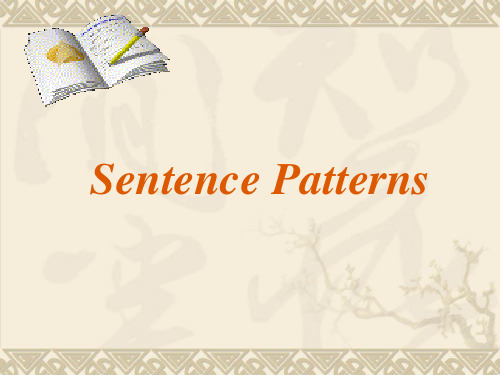
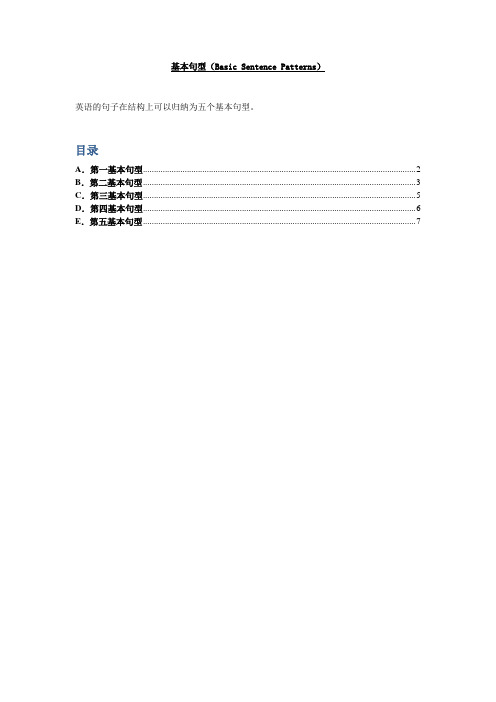
基本句型(Basic Sentence Patterns)英语的句子在结构上可以归纳为五个基本句型。
目录A.第一基本句型 (2)B.第二基本句型 (3)C.第三基本句型 (5)D.第四基本句型 (6)E.第五基本句型 (7)A.第一基本句型【例译】1.正在下着雨。
2.我的哥哥很用功。
3.我每天早晨六点钟起床。
4.日出于东而没于西。
5.比尔和吉姆每天都一起读书一起玩。
解说各例句的黑体字是主语,斜体字是谓语动词。
主语通常是一个,但是也可以如例5有两个,甚至两个以上都可以成立。
谓语动词也是一个较为普通,但是也可以如例4,5有两上,甚至更多也能成立。
本句型的Vi.属于完全不及物动词(Complete intransitive verb).注:“There + be(Vi.) + S…”也是属于第一基本句型。
例如:例:There is an alarm clock on her desk.(她的书桌上有一个闹钟。
)例:There stands a tower on the hill. (小山上耸立着一座塔。
)B.第二基本句型【例译】1.我的名字是汤姆。
2.约翰和玛丽是同班同学。
3.你准备好了吗?4.所有的问题都不容易回答。
5.你的梦想一定能实现的。
6.这些玫瑰花看起来很美,闻起来也很香。
解说各例句的黑体字是主语,斜体字是谓语动词,字底加线的是主语补语。
什么是主语补语?请观察:①My name is(我的名字是)②These roses look(这些玫瑰花看起来)上面两例虽各有可作主语的名词“name”和“roses”,也有谓语动词“is”和“look”,但是句意不清楚,无法表达完整的句意,所以不是句子。
现在若在例1之后加“Tom”,例2之后加“very beautiful”,那么句意就完整地表达出来了。
像这样,一个词(通常是n.pron.或adj.)在谓语部分里补充说明主语者就叫做主语补语。
主语补语通常是一个,但是依表达的需要也可以有两个(如例6),或更多。
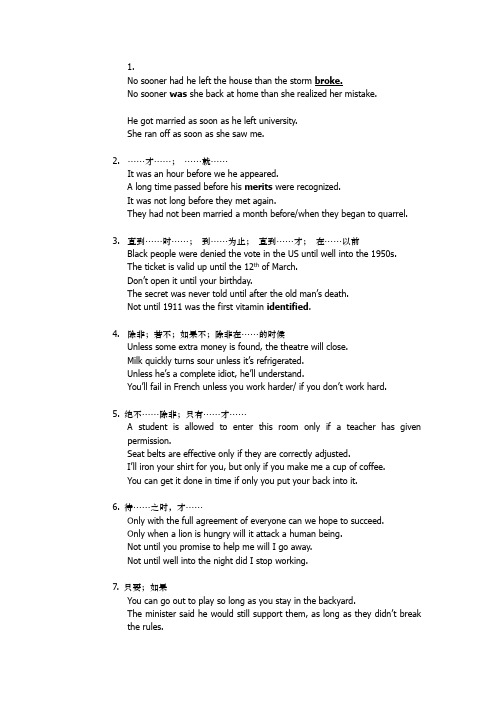
1.No sooner had he left the house than the storm broke.No sooner was she back at home than she realized her mistake.He got married as soon as he left university.She ran off as soon as she saw me.2. ……才……;……就……It was an hour before we he appeared.A long time passed before his merits were recognized.It was not long before they met again.They had not been married a month before/when they began to quarrel.3. 直到……时……;到……为止;直到……才;在……以前Black people were denied the vote in the US until well into the 1950s.The ticket is valid up until the 12th of March.Don’t open it until your birthday.The secret was never told until after the old man’s death.Not until 1911 was the first v itamin identified.4. 除非;若不;如果不;除非在……的时候Unless some extra money is found, the theatre will close.Milk quickly turns sour unless it’s refrigerated.Unless he’s a complete idiot, he’ll understand.You’ll fail in French unless you work harder/ if you don’t work hard.5. 绝不……除非;只有……才……A student is allowed to enter this room only if a teacher has givenpermission.Seat belts are effective only if they are correctly adjusted.I’ll iron your shirt for you, but only if you make me a cup of coffee.You can get it done in time if only you put your back into it.6. 待……之时,才……Only with the full agreement of everyone can we hope to succeed.Only when a lion is hungry will it attack a human being.Not until you promise to help me will I go away.Not until well into the night did I stop working.7. 只要;如果You can go out to play so long as you stay in the backyard.The minister said he would still support them, as long as they didn’t break the rules.The president need not step down as long as the elections held under international supervision.Detergent cannot harm a fabric, so long as it has been properly dissolved.8. 与其说……不如说……It is not so much advice as approval that we seek.The funding you have provided is not so much a material incentive as a moral support.The oceans do not so much divide the world as unite it.The great use of school education is not so much to teach you things as to teach you how to learn things.The difference between the two boys lies not so much in talents as in energy.9. 甚至不He cannot so much as spell a word like this.She cannot so much as read her own name.John passed right by my front door without so much as dropping in on me.10. … + as: 让步Beautiful though the necklace was, we thought it was overpriced so we didn’t buy it.Hero as he was, he could not stay invincible.Little as I like your criticism, I don’t think it is unfair.Change your mind as you will, I won’t change mine.11. 灵活的句型,表示原因,但也要视上下文含义而定。
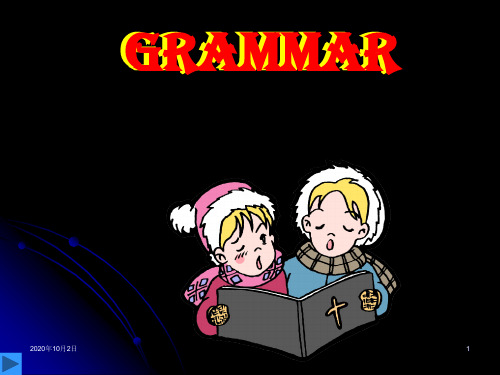
SentencepatternsSentence patterns1.八十年前的上海已有“东方的巴黎”之称,和国际大都会伦敦、巴黎齐名。
2.西安的考古遗址及其周边地区的旅游景观使游客时时感受到这座城市的昔日辉煌。
3.碑林始建于1090年,是刻有大量儒家经典著作的碑文。
4.泰山地处我国山东省的中部,绵延200多公里,其巅峰海拔1545米。
5.来到北京的观光客自然都会游览故宫和长城。
6.这座历史悠久的复合宫殿面积宏大,南北千米,东西750米,处处红柱黄瓦,尽显其特色。
7.如果说高楼林立代表了上海的经济繁荣,吸引了国内外人才汇集此地大展拳脚,那么休闲娱乐选择之多,则表现了上海多姿多彩的城市生活,吸引了海内外游客纷纷前来上海观光旅游。
8.历代文人雅士墨客所留下的1300多处石刻碑文,令游客目不暇接,叹为观止。
9.宽50米的护城河,以及10米高的围墙,将这座皇宫重重保护着,只留下四个出口。
10.风景区内那终年积雪的山峰,苍翠繁茂的森林,宁静幽远的湖泊,品种繁多的珍禽异兽,这些都构成了九寨沟风景区的独特风貌。
11.苏杭这两座邻近上海的历史名城以其秀丽的景色每年吸引了数以百万计的海内外游客。
12.而今,整座“紫禁城”被用作国家博物馆,陈列着众多珍贵的古代文物,包括中国瓷器、古物以及铜制工艺品。
13.上海人口近1700万,人口之众,决定了市场潜力。
14.在上海,上、中、下各阶层各有消费天地。
3元吃一碗拉面,或是20元喝一杯卡布奇诺,丰俭由人。
15.赶时髦是上海人消费的一大推动力。
1.八十年前的上海已有“东方的巴黎”之称,和国际大都会伦敦、巴黎齐名。
80 years ago Shanghai was already crowned as the “Oriental Paris”, which is equal in fame to international metropolis London and Paris.2.西安的考古遗址及其周边地区的旅游景观使游客时时感受到这座城市的昔日辉煌。
Sentence Patterns & Sentence Structures/ComponentsAccording to sentence structure, sentences have four types: simple sentence, compound sentence, complex sentence and compound-complex sentence.I. simple sentenceA simple sentence is one clause which contains one subject and one predicate verb only. There are seven basic sentence patterns if including.1. subject + linking verb + subject complement S + V + C (SC)I feel better.It tastes (smells) good.She is a great writer.They are on the playground now.2. subject + intransitive verb (vi) S + VShe cried.Birds fly.People laughed.3. subject + transitive verb (vt) or monotransitive verb + object S + V + OThey need help.She got a gift.Most of them speak Cantonese.4. subject +complex-transitive verb + object complement S + V + O + CWe made him our spokesman.We call her Amy.Many people find the book useful.They elected him president.5. subject + double-transitive verb or ditransitive + indirect object + direct object S + V + Oi + OdI show him a picture.Tom lent Andy a lot of money.Mr. Chen teaches the children English.Her parents buy clothes for her.6. subject + verb + adverbial S + Vi + AdI live in Guangzhou.All are staying at home.The team leaves at five.7. subject + verb + object + adverbial S + Vt + O + AdI put the material evidence in front of him.Her husband treated her cruelly.II. compound sentenceA compound sentence consists of at least two or more independent clauses, each containing a subject and a predicate, each describing an action complete in itself, and they are equally important. The clauses of the compound sentence are linked by connectives. The following conjunctions indicate different relations of clauses.1. coordination (and, not only…but also)My father is a teacher, and my mother is a teacher too.He can not only speak English, but also she can speak Japanese.2. transition (but, yet, nevertheless, however)He worked hard, yet he failed.She asked me to go back, but I didn’t want to go with her.She’s vain and foolish, however people like her.3. alternation (or, otherwise, either…or, nor)We must hurry up, or we will miss the train.Either you come to my home, or I come to your home.Her answer is not right, nor is yours.4. cause and effect (so, for, therefore, then, hence, thus)We have wasted much time here, so we must set off in early morning.You needn’t worry about, for they have arrived there safely.She failed in exam again, therefore she felt worse this time.III. complex sentenceA complex sentence consists of one independent clause (main clause) and one or more than one dependent clauses (subordinate clause), with a connective word denoting the relation between the two parts. The dependent clause depends on the independent clause. The dependent clause may play the part of a subject, a complement (predicative), an object, an attributive (adjective), an adverbial or an appositive in main clause. 1. subject clauseWhat’s done can not be undone.That he passed the entrance examination is true.It is not important whether you attend the meeting or not.2. complement clauseThis is what I need.China is no longer what it used to be.The fact is that he helps me with his Chinese.3. object clauseWe can’t tell whose answer is right.He often asks me what my name is.I don’t know where we are heading to now.4. attributive clauseHe is a man who has few words.This is the most interesting story that I’ve ever heard.Can you hand me the book that (which) is lying on the table?5. adverbial clausea). time (after, as, as soon as, before, once, since, till, until, when, whenever, while)My father often read newspaper after we finish dinner.I’ll write to you as soon as I get there.The doorbell rang when I was cooking.b). place (where, wherever)You can go where you like.I’ll follow you wherever you are.c). cause (as, because, now that, since)We all have to stay at home today because it’s raining all day long.Now that your father asked for you, I’ll let you go.They have lived here for twenty years since they moved to this town.d). reason (for fear that, in case, in order that, so that)She studied very hard so that she got scholarship every year.He went to bed very early in order that he could get up early the next morning.You should write down some notes in case you miss something.e). result (that, so (that), such…that…)It rained so hard that we couldn’t go anywhere.It is such an interesting book that I almost forget to dinner.f). comparison (as, than)He was so brave as you expect.She is much older than she looks.g). manner (as, as if, as though)You can spend your money as you wish.He treats me well as if he were my brother.h). condition (if, on condition that, so long as, unless)We can get high marks if we study hard.Your composition will be much better so long as you make few grammar mistakes.My parents wouldn’t let me watch TV unless I finished homework.i). concession (although, as, even if, even though, however, though, no matter how (what, when, where, etc.)) Although it’s raining outside, the workers are still working hard.Even if he failed the experiment again and again, he would give up.No matter what happened, I’ll stay on your side.6. appositive clauseThe news that Susan got married on July 1 is true.Joe sent me a message that he wouldn’t come that day.A compound-complex sentence has at least two independent clauses (main clauses) and one dependent clause (subordinate clause). It is the combination of a compound sentence and a complex sentence. For example: Mr. Smith who is my teacher can not only play the piano, but also he can sing song.My uncle asked me to visit his house, which was not far from my home this afternoon, but I didn’t.I was late because it was raining, and I kept everybody waiting.The sentence—I was late, and I kept everybody waiting—is a coordinating compound sentence, and the sentence—I was late because it was raining—is a complex sentence. It belongs to an adverbial clause of cause in complex sentences.1)first, second, third, last(不推荐,原因:俗)2)firstly, secondly, thirdly, finally(不推荐,原因:俗)3)the first, the second, the third, the last(不推荐,原因:俗)4)in the first place, in the second place, in the third place, lastly(不推荐,原因:俗)5)to begin with, then, furthermore, finally(强烈推荐)6)to start with, next, in addition, finally(强烈推荐)7)first and foremost, besides, last but not least(强烈推荐)8)most important of all, moreover, finally9)on the one hand, on the other hand(适用于两点的情况)10)for one thing, for another thing(适用于两点的情况)Sentence CompositionsIn English, there are ten sentence compositions: subject, predicate, object, predicative, attributive, appositive, adverbial, complement, parenthesis (插入语) and address (呼语).Subject is the topic or theme of the sentence, which tells of what the sentence is about.1)n. Our teacher speaks very fast.2)pron. She likes playing tennis.3)num. Five is an odd number. (奇数) (偶数even)4)infinitive It is not easy to remember all these rules.5)gerund Learning grammar well is difficult.6)subject clause What I said is true.Predicate says something about the subject and bears the new information which the speaker or writer wants to transmit to the listener or reader. There are two types of predicates. If we use a verb or a verbal phrase as predicate, it is called simple predicate. If we use a link verb plus a predicative as predicate or a verb plus an infinitive (especially a modal verb plus an infinitive), it is called compound prediacte, e.g., Simple predicate1)v. He bought a dictionary yesterday.2)verbal phrase He is looking for his pen.Compound predicate1)link v. + predicative We are students.2)modal v. + infinitive I may be wrong.3)v. + infinitive We have to do something for them.Predicative expresses the status, characteristics or the quality of the subject.1)n. Mr Scott is a farmer.2)pron. That’s something we have always to keep in mind.3)num. My lucky number is seven. She was the first to learn about it.4)adj. His hair has gone white.5)adv. We are here.6)prep. phrase They are in the classroom.7)infinitive All I can do is t o send her a telegram.8)gerund My job is teaching them grammar.9)participle. Time is pressing. Let’s hurry up.10)predicative clause The suggestion is that we should recite wore words.Object represents the person or the thing that something is done to or the person who is concerned in the result of an action. Usually, an object is called a prepositional object when we put it after a preposition. In English there are four kinds of objects: direct object (a), indirect object (b), cognate object (c) and compound object (d), e.g.,She has ordered two tickets (a) for the seven-thirty show.He made an important discovery (a) recently.Please show me (b)your passport (a). = Please show your passport (a) to me (b).He bought me (b) a new coat (a). = He bought a new coat (a) for me (b).He lived a hard life (c) then. / He died a herioc death (c).The baby is sleeping a sound sleep (c). / Mary smiles a sweet smile (c).I wish to dream a beautiful dream (c ). / The child laughed a hearty laugh (c).He asked me to open the door (d). / I heard him singing the song (d) last night.We wish you happy (d).1)n. I’ve bought an English-Chinese dictionary.2)pron. They didn’t promise him anything.3)num. We need two. / I want the first.4)infinitive My father likes to swim in winter.5)gerund I enjoyed working with you.6)object clause Did you write down what she said?Attributive is used to modify a noun or a pronoun.1)n. He has bought a grammar book.2)adj. He gave a vivid description of the battle.3)pron. No difficulty whatsoever can stop our advance.4)num. There are two policemen in the street. / Please read the first paragraph.5)gerund This swimming pool is beautiful.6)participle The sleeping boy is my brother.There are some boys playing outside.She is takig care of the newly-born child.We must solve the problem left by history.7)infinitive I have a lot of homework to do.8)adv. The buildings around are of modern construction.9)prep.The book on the desk is mine.10)attributive clause The boy who went to the library is our monitor.Appositive is the further information after a noun or a pronoun referring to “who” or “what”.1)n. This is Mr Zhou, director of our hospital.2)pron. He himself finished it.3)num. We two will go shopping this afternoon.4)infinitive My job, to teach them grammar is hard.5)gerund Her task, looking after these children is important.6)appositive clause I had no idea that you were here.Adverbal is usually used to modify a verb, an adjective, an dverb or a sentence. There are ten kinds of adverbials in English.1)adverbial of time He is to fly to London tomorrow.2)adverbial of place The meeting was held in Xinjiang.3)adverbial of manner The workers there are paid by the week, not by the month.4)adverbial of cause Because of the warm and sunny weather, oranges grow very well here.5)adverbial of purpose We do it in this way so as to save time.6)adverbial of result He returned home to find his father dead.7)adverbial of condition Without plants, animals could not live in the world.8)adverbial of concession In spite of all his efforts, he failed.9)adverbial of comparison he worked as fast as a skilled worker.10)adverbial of degree He love his son very much.When we use an adverbial, we may choose one of the following parts of speech, phrases or clauses.1)n. It weighs almost a ton.2)adv. He runs very fast.3)adj. He got home, cold and hungry.4)prep. We are learning grammar in the classroom.5)infinitive. They study hard in order to pass the TEM4.6)participle. I like to sit there doing nithing.7)adverbial clause. He got up early so that he might catch the morning train.8)absolute construction.(1)n. / pron. + n. He talked about his friends, all of them film stars.(2)n. / pron. + adj. His face pale with rage, Borg rose to speak.(3)n. / pron. + adv. Dinner over, we decided to play bridge.(4)n. / pron. + prep. The teacher came in, (with) a book in his hand.(5)n. / pron. + infinitive. Much work to do, I don’t think I’ll have time to come and see you.(6)n. / pron. + participle. Some boys making so much noise, I could n’t study. / The question settled,we began our work.Complement is used to form complete semantic meaning of a sentence. There are subject complement (S.C.) and object complement (O.C.).1)n. We call her Zhang Sir. (O.C.) / She is called Zhang Sir. (S.C.)2)adj. The letter made him sad. (O.C.) / He was made sad. (S.C.)3)adv. I’ll let him out. (O.C.) / He will be let out. (S.C.)4)prep. We regard her as our friend. (O.C.) / She is regarded as our friend. (S.C)5)infinitive. The teacher made us recite the words. (O.C.) / We were made to recite the words. (S.O.)6)participle. I saw him crossing the street. (O.C.) / He was seen crossing the street. (S.C.)Parenthesis is one or more words introduced as an added explanation or thought, and in writing usually enclosed at both ends by a bracket or a comma.1)infinitive To be frank, I don’t quite agree with you.2)participle Judging from your accent, you must be from Scotland.3)prep. phrase This, in my opinion, is only one of the minor issues.4)adj. Sure enough, enemy planes came again the next day.5)adv. Honestly, I don’t need it at the moment.6)clause. What is more, 40 per cent of the families would get an income of over 10 000 yuan.7)sentence. The cross-talk, I think, was both intersting and instructive.Direct address is used to address somebody in the conversation.1)n. Hurry up, children!2)pron. You, stand up!3)person’s name. Tom, come here!Comparision—more effective?I love living in the city. I have a wonderful view of the entire city. I have an apartment. I can see the Golden Gate Bridge. I can see many cargo ships pass under the bridge each day. I like the restaurants in San Francisco. I can find wonderful food from just about every country. I don’t like the traffic in the city.I love living in the city of San Francisco. I have a wonderful view of the entire city from my apartment window. In addition, I can see the Golden Gate Bridge under which many cargo ships pass each day. I also like San Francisco because I can find wonderful restaurants with food from just about every country; however, I don’t like the traffic in the city.Example: How many clauses?1. When reports came into London Zoo that a wild puma had been spotted forty-five miles south of London, they were not taken seriously, but, as the evidence began to accumulate, experts from the Zoo felt obliged to investigate, for the descriptions given by people who claimed to have seen the puma were extraordinarily similar.2. Furthermore, he (a successful scientist) is not only critical of the work of others, but also of his own, since he knows that man is the least reliable of scientific instruments and that a number of factors tend to disturb impartial and objective investigation.。